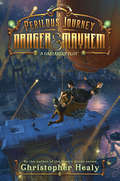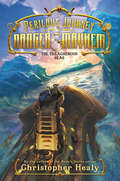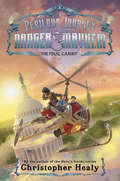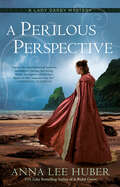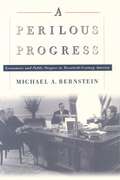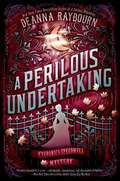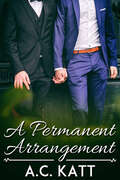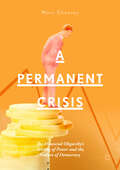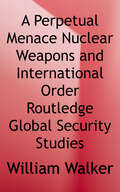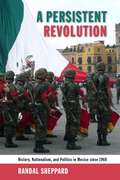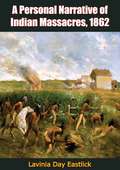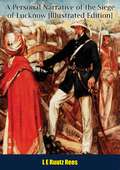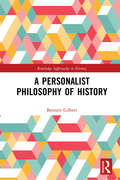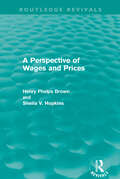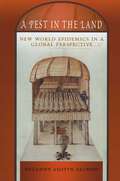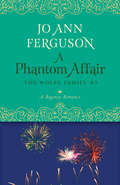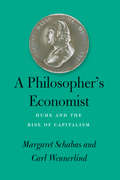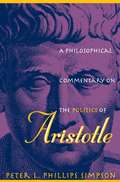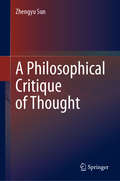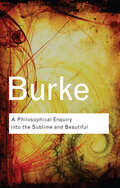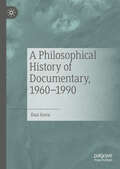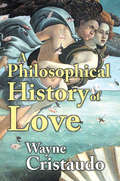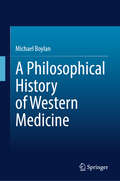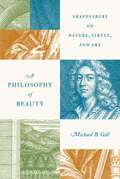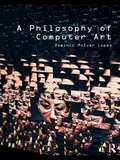- Table View
- List View
A Perilous Journey of Danger and Mayhem #1: A Dastardly Plot (Perilous Journey of Danger and Mayhem #1)
by Christopher HealyA rip-roaring, hilarious alternate-history adventure starring the world’s most famous inventors—and its most forgotten. From the author of the beloved Hero’s Guide series, Christopher Healy.It's 1883—the Age of Invention! A time when great men like Thomas Edison, Alexander Graham Bell, Nicola Tesla, and George Eastman work to turn the country into a land of limitless opportunity.And it all happens at the world famous Inventor’s Guild headquarters in New York City—a place where a great idea, a lot of hard work, and a little bit of luck can find you rubbing elbows with these gods of industry who will usher humanity into the future.Unless, of course, you’re a woman.Molly Pepper, daughter of brilliant but unknown inventor Cassandra Pepper, lives with her mother in New York. By day, they make ends meet running a pickle shop; but by night, they toil and dream of Cassandra taking her place among the most famous inventors in America.In an attempt to find a way to exhibit Cass’s work at the World’s Fair, they break into the Inventor's Guild, where they discover a mysterious plot to destroy New York.The evidence points to the involvement of one of the world’s most famous inventors, and now it’s up to Molly, Cassandra, and a shop hand named Emmett Lee to uncover the truth—even if no one will ever know it was they who did it.“Christopher Healy, author of the Hero’s Guide series, knows how to tell a good story. He’s done it again with the adventures of a determined girl named Molly Pepper.”—Brightly, Best Middle Grade Books of Fall 2018
A Perilous Journey of Danger and Mayhem #2: The Treacherous Seas (Perilous Journey of Danger and Mayhem #2)
by Christopher HealyThe second book in the new adventure trilogy from the beloved author of The Hero's Guide to Saving Your Kingdom.It's 1883—only a few months after Molly Pepper; her mother, Cassandra; and her friend, Emmett, saved New York from an attack by the megalomaniacal Ambrose Rector while managing to preserve the reputations of Alexander Graham Bell and Thomas Edison, whose technology was manipulated in Rector’s scheme. Their selfless heroism will finally earn them a place in the Inventors’ Guild, alongside the greatest minds of their generation.Unless, of course, no one knows that they did any of that.Left with nothing but empty promises and a struggling pickle shop after the government chooses to cover up the crisis, Molly, Cassandra, and Emmett have no idea where to turn—until they learn of a daring expedition to the South Pole, where an meteorite of mysterious power is embedded, and where Emmett’s father, explorer and ship captain Wendell Lee, disappeared years ago. With the fate of the world hanging in the balance, our heroes commandeer an experimental seacraft to make their play on the pole. But the trip is more treacherous than they realize, and there’s no guarantee that they will return successful—if they even return at all.
A Perilous Journey of Danger and Mayhem #3: The Final Gambit (Perilous Journey of Danger and Mayhem #3)
by Christopher HealyThe thrilling conclusion to Christopher Healy's funny, action-packed, acclaimed alt-history adventure!It is 1884, and Molly and Cassandra Pepper, Emmett Lee, and Emmett’s long-lost father are sailing back to New York following their death-defying adventure in Antarctica. Having discovered a subterranean world at the South Pole while saving the world from certain doom once again, surely their accomplishments will finally earn them the recognition they deserve.Unless, of course . . . well, you know by now.And so do the Peppers and Lees. They’re used to having their deeds covered up by the government in order to protect powerful men, and frankly, they’re sick of it. And when their return to New York doesn’t go the way they’d planned, they decide that maybe it’s best to go into hiding and accept that, perhaps, the forces aligned against them are just too great.As the 1884 presidential election approaches, however, our heroes discover a plot against leading candidate Thomas Edison that only they can stop. It’ll be up to them to decide whether to come out of hiding, make the perilous journey to Washington, DC, and do the right thing one last time. Even if it means risking everything they have left.
A Perilous Perspective (A Lady Darby Mystery #10)
by Anna Lee HuberAn all-new historical mystery in this USA Today bestselling series featuring beloved inquiry agents Lady Kiera Darby and her dashing husband, Sebastian Gage.Argyll, Scotland. July 1832. After a trying few months in Edinburgh, Kiera and her husband and investigative partner, Sebastian Gage, are eager to escape to the Highlands with their three-month-old child. Kiera is overjoyed for her cousin Rye and her detractor-turned-friend Charlotte who are being wed in a private ceremony at the estate of Rye&’s great-uncle, the Marquess of Barbreck, in what seems to be the perfect wedding party. But when Kiera is invited to peruse Barbreck&’s extensive art collection, she is disturbed to discover that one of his most priceless paintings seems to be a forgery. The marquess&’s furious reaction when she dares to mention it leaves her shaken and the entire house shocked. For it turns out that this is not the first time the word forgery has been uttered in connection with the Barbreck household. Matters turn more ominous when a maid from a neighboring estate is found murdered where the forged painting hangs. Is her death connected to the forgeries, perhaps a grisly warning of what awaits those who dare to probe deeper? With unknown entities aligned against them, Kiera and Gage are forced to confront the fact that they may have underestimated their opponent. For they are swiftly made to realize that Charlotte&’s and Rye&’s future happiness is not the only issue at stake, and this stealthy game of cat and mouse could prove to have deadly consequences.
A Perilous Progress: Economists and Public Purpose in Twentieth-Century America
by Michael A. BernsteinThe economics profession in twentieth-century America began as a humble quest to understand the "wealth of nations." It grew into a profession of immense public prestige--and now suffers a strangely withered public purpose. Michael Bernstein portrays a profession that has ended up repudiating the state that nurtured it, ignoring distributive justice, and disproportionately privileging private desires in the study of economic life. Intellectual introversion has robbed it, he contends, of the very public influence it coveted and cultivated for so long. With wit and irony he examines how a community of experts now identified with uncritical celebration of ''free market'' virtues was itself shaped, dramatically so, by government and collective action. In arresting and provocative detail Bernstein describes economists' fitful efforts to sway a state apparatus where values and goals could seldom remain separate from means and technique, and how their vocation was ultimately humbled by government itself. Replete with novel research findings, his work also analyzes the historical peculiarities that led the profession to a key role in the contemporary backlash against federal initiatives dating from the 1930s to reform the nation's economic and social life. Interestingly enough, scholars have largely overlooked the history that has shaped this profession. An economist by training, Bernstein brings a historian's sensibilities to his narrative, utilizing extensive archival research to reveal unspoken presumptions that, through the agency of economists themselves, have come to mold and define, and sometimes actually deform, public discourse. This book offers important, even troubling insights to readers interested in the modern economic and political history of the United States and perplexed by recent trends in public policy debate. It also complements a growing literature on the history of the social sciences. Sure to have a lasting impact on its field, A Perilous Progress represents an extraordinary contribution of gritty empirical research and conceptual boldness, of grand narrative breadth and profound analytical depth.
A Perilous Undertaking (A Veronica Speedwell Mystery #2)
by Deanna RaybournVeronica Speedwell returns in a brand new adventure from Deanna Raybourn, the New York Times bestselling author of the Lady Julia Grey mysteries... London, 1887. Victorian adventuress and butterfly hunter Veronica Speedwell receives an invitation to visit the Curiosity Club, a ladies-only establishment for daring and intrepid women. There she meets the mysterious Lady Sundridge, who begs her to take on an impossible task—saving society art patron Miles Ramsforth from execution. Accused of the brutal murder of his artist mistress Artemisia, Ramsforth will face the hangman’s noose in a week’s time if Veronica cannot find the real killer.But Lady Sundridge is not all that she seems, and unmasking her true identity is only the first of the many secrets Veronica must uncover. Together with her natural historian colleague Stoker, Veronica races against time to find the true murderer—a ruthless villain who not only took Artemisia’s life in cold blood but is happy to see Ramsforth hang for the crime. From a Bohemian artists’ colony to a royal palace to a subterranean grotto with a decadent history, the investigation proves to be a very perilous undertaking indeed....
A Permanent Arrangement
by A. C. KattColin Kelly returns from the war with the sure knowledge that his marriage to Edna is a sham. He only insists on his own child and he gets her, his darling little girl Babs. For the rest, he copes as best he can until Edna places Babs in a boarding school and Colin ends up on the streets.Bill Teague has loved Colin since he first saw him strolling through the art fair with little Babs on his shoulder. So when an old acquaintance calls him to come to Colin's aid before he throws him out of the pub for good, Bill goes.Face to face in Bill's apartment, will their friendship survive the mutual confessions and legal problems Colin has?
A Permanent Crisis: The Financial Oligarchy’s Seizing of Power and the Failure of Democracy
by Marc ChesneyThis short book describes the role big banks played in the financial crisis of 2008 while denouncing the financial oligarchy’s seizing of power and the dangers it represents for democracy today. There have been many books since the financial crisis that have considered historical events leading up to the crisis but few that consider a solution. Ten years after the great financial crash, this book synthesises the historical developments and introduces a proposal aimed at rebalancing the economy and society at large. The author presents a novel solution that would change current tax systems in the developed world, in their entirety.This book will be of interest to students, practitioners and researchers, as well as the wider informed audience.
A Perpetual Menace: Nuclear Weapons and International Order (Routledge Global Security Studies)
by William WalkerWritten by a leading scholar in the field of nuclear weapons and international relations, this book examines 'the problem of order' arising from the existence of weapons of mass destruction. <p><p>This central problem of international order has its origins in the nineteenth century, when industrialization and the emergence of new sciences, technologies and administrative capabilities greatly expanded states' abilities to inflict injury, ushering in the era of total war. It became acute in the mid-twentieth century, with the invention of the atomic bomb and the pre-eminent role ascribed to nuclear weapons during the Cold War. <p><p>It became more complex after the end of the Cold War, as power structures shifted, new insecurities emerged, prior ordering strategies were called into question, and as technologies relevant to weapons of mass destruction became more accessible to non-state actors as well as states. <p><p>William Walker explores how this problem is conceived by influential actors, how they have tried to fashion solutions in the face of many predicaments, and why those solutions have been deemed effective and ineffective, legitimate and illegitimate, in various times and contexts.
A Persistent Revolution: History, Nationalism, and Politics in Mexico since 1968
by Randal SheppardSheppard explores Mexico&’s profound political, social, and economic changes through the lens of the persistent political power of Mexican revolutionary nationalism. By examining the major events and transformations in Mexico since 1968, he shows how historical myths such as the Mexican Revolution, Benito Juárez, and Emiliano Zapata as well as Catholic nationalism emerged during historical-commemoration ceremonies, in popular social and anti-neoliberal protest movements, and in debates between commentators, politicians, and intellectuals. Sheppard provides a new understanding of developments in Mexico since 1968 by placing these events in their historical context.The work further contributes to understandings of nationalism more generally by showing how revolutionary nationalism in Mexico functioned during a process of state dismantling rather than state building, and it shows how nationalism could serve as a powerful tool for non-elites to challenge the actions of those in power or to justify new citizenship rights as well as for elites seeking to ensure political stability.
A Personal Narrative of Indian Massacres, 1862
by Lavinia Day EastlickThis is a fascinating, detailed firsthand eyewitness account of the Sioux Indian massacre at Lake Shetek in Minnesota that took place on August 20, 1862 by one of its survivors, Mrs. Lavinia Eastlick.“In presenting this pamphlet to the public, I have given merely a plain, unvarnished statement of all the facts that came under my own observation, during the dreadful massacre of the settlers of Minnesota. Mine only was a single case among hundreds of similar instances. It is only from explicit and minute accounts from the pen of the sufferers themselves, that people living at this distance from the scene of those atrocities can arrive at any just and adequate conception of the fiendishness of the Indian character, or the extremities of pain, terror and distress endured by the victims. It can hardly be decided which were least unfortunate, those who met an immediate death at the hands of the savages, or the survivors who, after enduring tortures worse than death, from hunger, fear, fatigue, and wounds, at last escaped barely with life.”—Mrs. L. EastlickThis book also includes photos, affidavits, and other material that were compiled by Mr. Ross A. Irish, Mrs. Eastlick nephew.
A Personal Narrative of the Siege of Lucknow [Illustrated Edition]
by L E Ruutz Rees[Illustrated with over one hundred maps, photos and portraits, of the battles, individuals and places involved in the Indian Mutiny]Fascinating account of Calcutta businessman and merchant L.E. Ruutz Rees of the tumultuous events of the Sepoy Revolt that threatened to overturn British power in India. At time of the rebellion he was travelling toward Oudh, which was to be a hotbed of violence in the coming months, and arrived at Lucknow. Initially confident that a complete uprising was not likely, Rees joined the irregular cavalry under General Lawrence when it was clear that significant fighting was imminent. He recounts the ill-conceived and badly managed attempt by Lawrence to breakout of Lucknow and following the botched battle of Chinnut he was forced back to Lucknow and the bitter fighting of the siege. Rees recounts the difficulties, heroics, brutalities and hard fighting of the siege within the 33 acre Residency site that lasted 88 days until the first relief. The final deliverance only arrived many days and much hardship later with the appearance of Sir Colin Campbell’s force as the second relief of Lucknow.
A Personalist Philosophy of History (Routledge Approaches to History)
by Bennett GilbertHistorical study has traditionally been built around the placement of the human at the center of inquiry. The de-stabilized concepts of the human in contemporary thought challenge this configuration. However, the ways in which these challenges provoke new historical perspectives both expand and enrich historical study but are also weak and vulnerable in their concept of the human, lacking or omitting something valuable in our self-understanding. A Personalist Philosophy of History argues for a robust concept of personhood in our experience of the past as a way to resolve this conflict. Focused on those who know history, rather than on the abstract properties of knowledge, it extends the moral agency of persons into non-human, trans-human, and deep history domains. It describes an approach to moral life through historical experience and study, rather than through abstractions. And it describes a kind of historiography that matches factual accuracy to both the constructed nature of understanding and to unavoidable moral purpose.
A Perspective of Wages and Prices (Routledge Revivals)
by Henry Phelps Brown Sheila V. HopkinsFirst published in book form in 1981, this collection of essays originally written between 1955 and 1966 contains ground-breaking research and analysis on the study of wages and prices across seven centuries, with particular reference to builder’s wage rates and the price of a bundle of the commodities on which these wages might be spent. These seminal contributions to the economics of labour and economic growth did much to fuel the debate surrounding the problems of inflation, stability and changes in the purchasing power of money upon the book’s initial publication. These concerns are every bit as relevant in today’s post credit-crunch society and this reissue will be welcomed by all students of economic history and labour economics.
A Pest in the Land: New World Epidemics in a Global Perspective (Diálogos Series)
by Suzanne Austin AlchonNewly pertinent to today&’s coronavirus pandemic, this study of disease among the native peoples of the New World before and after 1492 challenges many widely held notions about encounters between European and native peoples. Whereas many late twentieth century scholars blamed the catastrophic decline of postconquest native populations on the introduction of previously unknown infections from the Old World, Alchon argues that the experiences of native peoples in the New World closely resembled those of other human populations. Exposure to lethal new infections resulted in rates of morbidity and mortality among native Americans comparable to those found among Old World populations.Why then did native American populations decline by 75 to 90 percent in the century following contact with Europeans? Why did these populations fail to recover, in contrast to those of Africa, Asia, and Europe? Alchon points to the practices of European colonialism. Warfare and slavery increased mortality, and forced migrations undermined social, political, and economic institutions.This timely study effectively overturns the notion of New World exceptionalism. By showing that native Americans were not uniquely affected by European diseases, Alchon also undercuts the stereotypical notion of the Americas as a new Eden, free of disease and violence until the intrusion of germ-laden, rapacious Europeans.
A Phantom Affair
by Jo Ann FergusonEllen Dunbar (who first appeared in The Smithfield Bargain) visits Wolfe Abbey, the home of Corey Wolfe, Marquess Wulfric (who first appeared in The Wolfe Wager), to watch a fireworks show. She finds Lord Wulfric fun and enjoys the fireworks until something goes terribly wrong. Fireworks explode, knocking her from her feet and fatally wounding the marquess. She is shattered at his death, but her despair becomes astonishment when, that night, Corey reappears . . . as a ghost! He vows to find her the perfect husband before the chrysanthemums bloom at summer's end. The problem is, as Corey match-makes for Ellen (who is the only one who can see and hear him), he begins to fall in love with her himself. So what's a ghost to do when he's made a vow and he can't even touch the woman he loves?
A Philosopher's Economist: Hume and the Rise of Capitalism
by Margaret Schabas Carl WennerlindAlthough David Hume’s contributions to philosophy are firmly established, his economics has been largely overlooked. A Philosopher’s Economist offers the definitive account of Hume’s “worldly philosophy” and argues that economics was a central preoccupation of his life and work. Margaret Schabas and Carl Wennerlind show that Hume made important contributions to the science of economics, notably on money, trade, and public finance. Hume’s astute understanding of human behavior provided an important foundation for his economics and proved essential to his analysis of the ethical and political dimensions of capitalism. Hume also linked his economic theory with policy recommendations and sought to influence people in power. While in favor of the modern commercial world, believing that it had and would continue to raise standards of living, promote peaceful relations, and foster moral refinement, Hume was not an unqualified enthusiast. He recognized many of the underlying injustices of capitalism, its tendencies to promote avarice and inequality, as well as its potential for political instability and absolutism. Hume’s imprint on modern economics is profound and far reaching, whether through his close friend Adam Smith or later admirers such as John Maynard Keynes and Friedrich Hayek. Schabas and Wennerlind’s book compels us to reconsider the centrality and legacy of Hume’s economic thought—for both his time and ours—and thus serves as an important springboard for reflections on the philosophical underpinnings of economics.
A Philosophical Commentary on the Politics of Aristotle
by Peter L. SimpsonThe Politics, Aristotle's classic work on the nature of political community, has been a touchstone of Western debates about society and government. In this volume, Peter Simpson presents a complete philosophical commentary on the Politics, an analysis of the logical structure of the entire text and each of its constitutive arguments and conclusions. Unlike other contemporary works on the Politics, Simpson's philosophical commentary is not, save incidentally, a discussion of philological and historical questions, a speculative elaboration of Aristotle's arguments, or a comparison of the philosopher's ideas with those of other ancient and modern theorists. Such treatments, argues Simpson, must be grounded in a thorough understanding of the philosophical content of the work--a point that underscores the need for this thorough and accurate analysis. Keyed to the ancient Greek text as well as to Simpson's own innovative translation of it (UNC Press, 1997), this book will stand as a valuable commentary on the philosophical argument in the Politics and will serve as a sound basis for future study of Aristotle's political thought."A 'must read' for scholars of the Politics.--Choice"The entire edition is marked by a dashing boldness of judgment, and by confidence of tone and argumentation.--Polis"The commentary has many attractive features for the reader of Aristotle. All Greek is transliterated, and Bekker numbers are provided for easy cross-reference. Not least, it is written in clear and accessible prose. No reader of Aristotle's Politics can ignore this important work.--Classical WorldThe Politics, Aristotle's classic work on the nature of political community, has been a touchstone of Western debates about society and government. Here, Peter Simpson presents a thorough analysis of the logical structure of the entire text and each of its constitutive arguments and conclusions. A valuable commentary on the philosophical argument in the Politics, the book will also serve as a sound basis for future study of Aristotle's political thought. -->
A Philosophical Critique of Thought
by Mei YangThis book is mainly concerned with elaborating an account of the unique theoretical essence and activities of philosophy. What manner of civilization should modern humans forge? On what developmental path should a nation embark? What lifestyle should each individual choose? These are the most fundamental issues of our time. Profoundly implicit in the choices outlined above is a deeper question: What are the criteria of choice? An examination of these criteria is a reflection on the premises constituting thought, or a critique of the premises underlying thought. Using a “critique of the premises underlying thought” as the basic idea and hermeneutic principle in philosophy will open a wider theoretical space for contemporary philosophy so as to avoid the predicament of being “pseudo-scientific” or “pseudo-artistic.” It will also present contemporary philosophy with a realistic path of development for the task of reflecting on the criteria of choice. This book seeks to formulate concrete philosophical arguments for a critique of the basic beliefs, logic, modes, concepts, and philosophical ideas which constitute thought, with the aim of demonstrating the vigorous self-critique and inexhaustible theoretical space found in philosophical development. This book provides a new principle of interpretation for understanding philosophy and, in turn, uses this principle to develop a critique of the premises underlying thought, thereby furthering the contemporary development of philosophy. This book encompasses a critique of the premises underlying thought, which mainly includes the basic beliefs, logic, modes, concepts, and philosophical ideas constituting thought. Such a critique should comprise five aspects: First, the basic beliefs constituting thought propose a critique of the identity of thought and being; second, the basic logic constituting thought refers to a critique of the formal, intensional, and practical logic of thought; third, the basic modes constituting thought denote a critique of the basic modes by which humans comprehend the world, including commonsense, religion, art, and science; fourth, the basic concepts constituting thought entail a critique centering on being, the world, history, truth, value, and other basic concepts; and finally, the philosophical ideas constituting thought indicate a critique of philosophy itself. A critique aligned on these five aspects will provide a general philosophical overview of the premise critique of thought.
A Philosophical Enquiry Into the Sublime and Beautiful: With An Introductory Discourse Concerning Taste And Several Other Additions (Routledge Classics)
by Edmund BurkeEdited with an introduction and notes by James T. Boulton. 'One of the greatest essays ever written on art.'– The Guardian Edmund Burke’s A Philosophical Enquiry into the Origin of our Ideas of the Sublime and Beautiful is one of the most important works of aesthetics ever published. Whilst many writers have taken up their pen to write of "the beautiful", Burke’s subject here was the quality he uniquely distinguished as "the sublime"—an all-consuming force beyond beauty that compelled terror as much as rapture in all who beheld it. It was an analysis that would go on to inspire some of the leading thinkers of the age, including Immanuel Kant and Denis Diderot. The Routledge Classics edition presents the authoritative text of the first critical edition of Burke’s essay ever published, including a substantial critical and historical commentary. Edmund Burke (1729–1797). A politician, philosopher and orator, Burke lived during a turbulent time in world history, which saw revolutions in America and France that inspired his most famous work, Reflections on the Revolution in France.
A Philosophical History of Documentary, 1960-1990
by Dan GevaA Philosophical History of Documentary, 1960–1990 is the second book in a three-volume set. It offers a systematic hermeneutical reading of thirty definitions of Documentary from 1960 to 1990—by then a familiar, already used, and &“abused&” dialectical object of thought and practice. The book progresses chronologically through three decades of ongoing efforts by documentarians, theorists, historians, and philosophers to define Documentary, examining the philosophical foundations, ethical implications, and evolving documentarological sensibilities of these definitions. It also reassesses the intense ontological debates about Documentary, highlighting the discourse's expanding definitional landscape. Building on the first volume, which examined thirty definitions from 1895 to 1959, this work weaves an intricate hermeneutical network of interconnections among all sixty definitions. It further anticipates the third volume, which will analyze forty additional definitions of Documentary from 1991 to the present, offering a comprehensive philosophical history of the evolution of Documentary as both concept and practice.
A Philosophical History of Love
by Wayne CristaudoA Philosophical History of Love explores the importance and development of love in the Western world. Wayne Cristaudo argues that love is a materializing force, a force consisting of various distinctive qualities or spirits. He argues that we cannot understand Western civilization unless we realize that, within its philosophical and religious heritage, there is a deep and profound recognition of love's creative and redemptive power. Cristaudo explores philosophical love (the love of wisdom) and the love of God and neighbor. The history of the West is equally a history of phantasmic versions of love and the thwarting of love. Thus, the history of our hells may be seen as the history of love's distortions and the repeated pseudo-victories of our preferences for the phantasms of love. Cristaudo argues that the catastrophes from our phantasmic loves threaten to extinguish us, forcing us repeatedly to open ourselves to new possibilities of love, to new spirits. Fusing philosophy, literature, theology, psychology, and anthropology, the volume reviews major thinkers in the field, from Plato and Freud, to Pierce, Shakespeare, and Flaubert. Cristaudo explores the major themes of love of the Church, romantic love and the return of the feminine, the conflict between familial and romantic love, love in a meaningless world and the love of evil, and the evolutionary idea of love. With Cristaudo, the reader embarks on a journey not just through time, but also through the different kinds, origins, and spirits of love.
A Philosophical History of Western Medicine
by Michael BoylanThis book provides an historical and philosophical overview of Western medicine along with commentary about how past principles affect current problems in biomedicine like genetic engineering, transhumanism, and a commitment to environmentalism. The book spans Ancient, Hippocratic and Galenic texts, Medieval writings, Modern contributions, and contemporary discoveries in the history and philosophy of medicine, including the growing role of technology in the practice of medicine. This book is of essential reading material for scholars and students interested in the history and philosophy of science as it relates to medicine, as well as those interested in the normative consequences of the study of nature for our contemporary world, particularly as it relates to medicine, environmental ethics, and genetic engineering.
A Philosophy of Beauty: Shaftesbury on Nature, Virtue, and Art
by Michael B. GillAn engaging account of how Shaftesbury revolutionized Western philosophyAt the turn of the eighteenth century, Anthony Ashley Cooper, the third Earl of Shaftesbury (1671–1713), developed the first comprehensive philosophy of beauty to be written in English. It revolutionized Western philosophy. In A Philosophy of Beauty, Michael Gill presents an engaging account of how Shaftesbury’s thought profoundly shaped modern ideas of nature, religion, morality, and art—and why, despite its long neglect, it remains compelling today.Before Shaftesbury’s magnum opus, Charactersticks of Men, Manners, Opinions, Times (1711), it was common to see wilderness as ugly, to associate religion with fear and morality with unpleasant restriction, and to dismiss art as trivial or even corrupting. But Shaftesbury argued that nature, religion, virtue, and art can all be truly beautiful, and that cherishing and cultivating beauty is what makes life worth living. And, as Gill shows, this view had a huge impact on the development of natural religion, moral sense theory, aesthetics, and environmentalism.Combining captivating historical details and flashes of humor, A Philosophy of Beauty not only rediscovers and illuminates a fascinating philosopher but also offers an inspiring reflection about the role beauty can play in our lives.
A Philosophy of Computer Art
by Dominic LopesWhat is computer art? Do the concepts we usually employ to talk about art, such as ‘meaning’, ‘form’ or ‘expression’ apply to computer art? A Philosophy of Computer Art is the first book to explore these questions. Dominic Lopes argues that computer art challenges some of the basic tenets of traditional ways of thinking about and making art and that to understand computer art we need to place particular emphasis on terms such as ‘interactivity’ and ‘user’. Drawing on a wealth of examples he also explains how the roles of the computer artist and computer art user distinguishes them from makers and spectators of traditional art forms and argues that computer art allows us to understand better the role of technology as an art medium.
